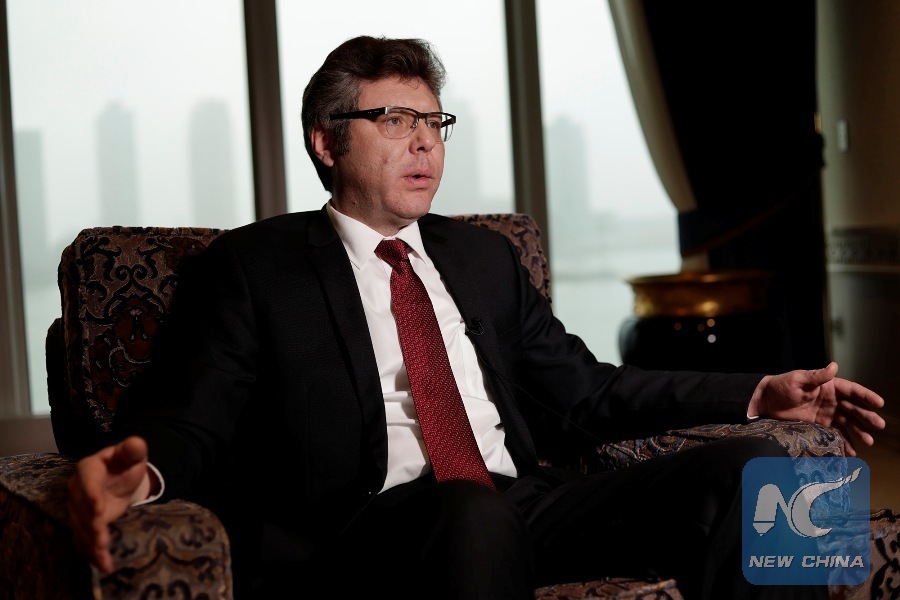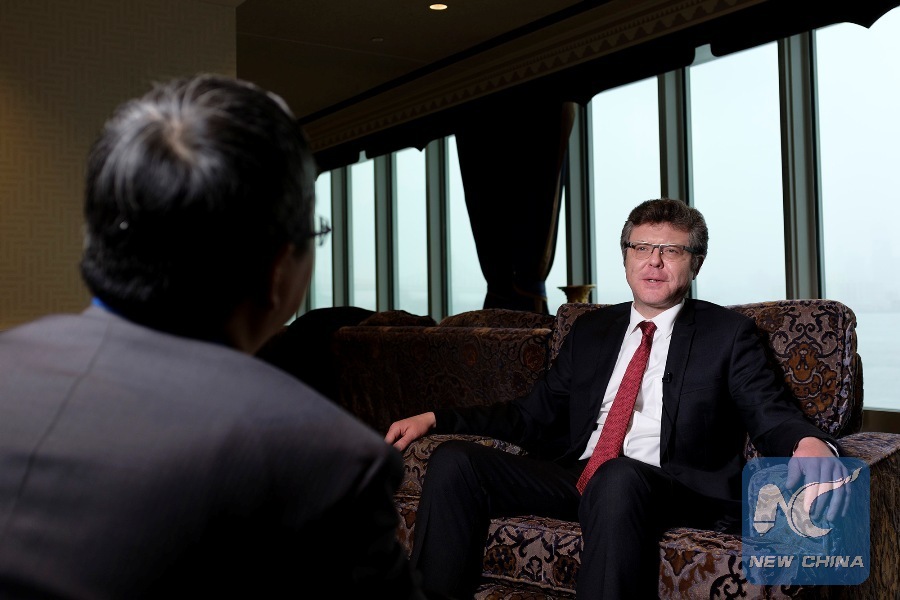
Ruslan Bultrikov, the deputy permanent representative of Kazakhstan, speaks during an exclusive interview with Xinhua News Agency at the UN headquarters in New York, April 6, 2017. (Xinhua/Li Muzi)
by Xinhua writer Gu Zhenqiu
UNITED NATIONS, April 13 (Xinhua) -- Kazakhstan is proud that it is the country where Chinese President Xi Jinping first put forward the Belt and Road Initiative, and fully supports the efforts to bring this important Chinese vision into reality, a senior Kazakh diplomat told Xinhua in an exclusive interview.
"We are proud that this initiative was first announced in Kazakhstan during a visit of President Xi Jinping," Ruslan Bultrikov, the deputy permanent representative of Kazakhstan to the United Nations, said.
In a speech delivered at the Nazarbayev University on Sept. 7, 2013, President Xi proposed that China and Central Asia join hands to build a Silk Road economic belt to boost regional cooperation.
The Chinese president's speech "is very symbolic because this concept was first announced during his meeting with students, who represent the young generation and for whom great project will be carried out," Bultrikov said.
KAZAKHSTAN'S FULL SUPPORT
"Kazakhstan has been very supportive of this proposal since its announcement," he said, adding that "now (it) comes its implementation stage."
"Being the largest land-locked country, Kazakhstan is very interested in developing its infrastructure and transportation, as well as developing trade and economic relations with its neighbors and beyond," he said. "From this point of view, this immense and significant plan proposed and implemented by China, is very important for us, and is in line with our priorities and national strategies."
For example, Bultrikov said, Kazakh President Nursultan Nazarbayev announced in November 2014 his new economic plan, known as "Nurly Zhol" (meaning "bright path" in the Kazakh language), which will drive investment into critical infrastructure and priority sectors totaling around 9 billion U.S. dollars.
"The main objective of this national program is to build infrastructure, namely, of new roads and railroads -- to connect remote places within the country, as well as, to provide transit for foreign goods and travel from the East to the West, and from the West to the East," he said.
"So we consider this major plan as not only the restoration of the great Silk Road, which existed on our territory for a long time, but also as an absolutely new approach because this Belt and Road Initiative is not only about trade and transportation. It is (also) about developing calculation in different spheres, including technological transfer, cultural exchanges and relevant sectors," he said.
"The fact that China is implementing this project with partners is very valuable for us because China is our largest trade and economic partner and one of the largest investors in Kazakhstan, he said. "Together, we can further develop transportation and infrastructure projects."

Ruslan Bultrikov, the deputy permanent representative of Kazakhstan, speaks during an exclusive interview with Xinhua News Agency at the UN headquarters in New York, April 6, 2017. (Xinhua/Li Muzi)
PROGRESS ACHIEVED
The deputy permanent representative said that currently, Kazakhstan, along with international donors and partners, has completed construction of the West China-West Kazakhstan Road, which will significantly reduce costs and time of transportation of goods. The building of new roads will help create new jobs in the country, he said.
"Another important encouraging aspect of this initiative is that it went global; of course, it's about connecting Asia and Europe, but now countries from different regions are interested in joining this effort. It will make a difference," he said.
China's Belt and Road Initiative, a master plan to integrate 65 countries from East Asia to Western Europe, is poised to improve the living standards of 4.4 billion people -- more than half of the world's population.
More than 100 countries and international organizations have joined the initiative, and more than 40 of them have cooperation agreements with China.
Chinese businesses have helped build 56 economic and trade cooperation zones in 20 countries along the Belt and Road, with a total investment exceeding 18 billion U.S. dollars, thus helping to generate more than 1 billion U.S. dollars in tax revenue and more than 160,000 jobs.
"We are very optimistic and most supportive of this, and are ready to work together with China and other partners "to make this Belt and Road Initiative a reality, Bultrikov said.
China will host a Belt and Road Forum for international cooperation in Beijing this May to explore ways to address regional and global economic problems, generate fresh energy for interconnected development, and ensure that the Belt and Road Initiative delivers greater benefits to people of the countries involved.
"Taking into account the very active development related to the Belt and Road Initiative and interest from many partners, countries and international organizations in the practical implementation of this project, I believe the meeting in May will further contribute to advancing and realizing the goals of this extraordinary initiative," he said.
"Taking into account that if implemented, this endeavour will cover more than half of the world's population -- almost half of world's GDP, we believe that it will be of interest not only for the countries engaged in implementing this project within the framework of Belt and Road Initiative, but also for the entire globe," Bultrikov said.
Noting a rising trend of protectionism and voices against globalization, he said, "I believe that globalization is a reality; we have to live with it, and every country is influenced by the situation of the world economy."
"The principle of free trade must prevail, and we are ready to live according to these rules," he said.
On the Chinese concept of building "a community of shared future for humankind," Bultrikov said, "We all know that the Chinese civilization is very ancient with longstanding traditions. We also know that it is the Chinese culture to foresee and plan for generations ahead, and not just for the five to 10 years to come."
"We therefore understand why the Chinese leader has made pledges which are directed to future generations," he said. "I believe that with political will from other countries and from China, of course, these ideas can be implemented and we will share the future together peacefully."
At present, Kazakhstan is one of the elected 10 non-permanent members of the UN Security Council. As a non-permanent member of the 15-nation Council, he said his country is "closely cooperating with China and other permanent members" in the area of peace and security -- the main mandate of this major UN body.
The Belt and Road Initiative was included in a Security Council resolution on Afghanistan on March 17, he said that was "reflecting the understanding that there is no peace without development, and no development without peace."
"We are also cooperating closely with the Chinese delegation on almost all subjects within the General Assembly," Bultrikov said, citing the example of the cooperation of Kazakhstan and China, when the two countries were members of the open-ended group, together with Indonesia. for formulating and implementing the 17 Sustainable Development Goals."I personally was a member of the Troika," he said.
Bultrikov, who was born in June 1971, joined the Ministry of Foreign Affairs of Kazakhstan in 1993, and he was Kazakhstan's vice minister of environmental protection from 2011 to 2012.

